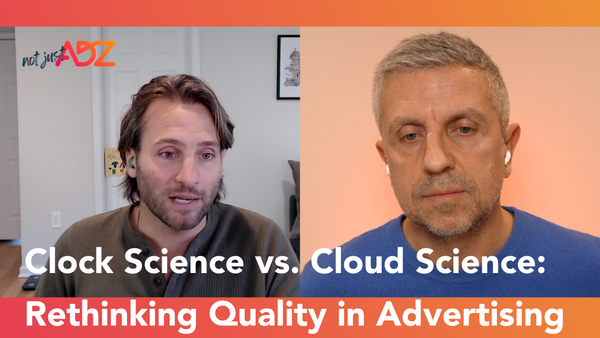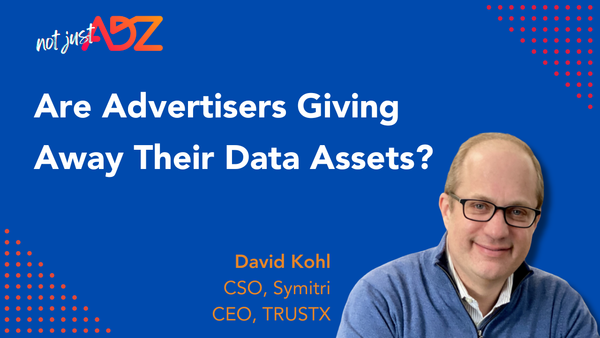Embracing Anonymity Is The Most Effective And Safest Path To Identity | AdExchanger
Fixing your own strategy and business model when the industry is a whirlwind of moving parts takes time, courage, vision and above all the…

Fixing your own strategy and business model when the industry is a whirlwind of moving parts takes time, courage, vision and above all the ability to recognize the risks associated with easy fixes.
I’ve described before how short-term choices left media owners vulnerable to frequent emergencies, which triggered more short-term decisions, which caused further emergencies. This vicious cycle slowed publishers down, cost them revenue and affected their ability to think and act strategically.
But in the last couple of years, quality publishers have matured, developing confidence in their value and a will to protect their own assets.
Meanwhile, the advertising landscape keeps wobbling. For instance, the UK Competition and Markets Authority’s (CMA’s) intention to investigate Google’s ‘Privacy Sandbox’ doesn’t help, not because it shouldn’t happen, but because it adds uncertainty. Adding to this uncertainty is Google’s announcement of a new Privacy Sandbox related proposal called FLEDGE, while the UK Information Commissioner’s Office recently communicated that it will resume its investigation on RTB and ad tech.
And while Google’s Privacy Sandbox isn’t an acceptable solution for quality media, it’s also delusional to believe we can prevent the disappearance of the third-party cookie and rewind back to the old way. (By the way, it will be interesting to see how a local UK CMA action will affect the Privacy Sandbox across different countries).
We are now at a crucial fork in the road, where we must bet on the few certainties, rather than gambling with the future by investing into the many houses of cards offered.
Many propositions try to re-create the old programmatic open marketplace, which was built on the delusion of infinite reach, never-ending quality and pinpoint identity. These propositions aim to maintain the old balance of power and try to persuade media owners to contribute their assets. Despite the sweet talk, this balance of power dumps publishers at the bottom.
Media owners must not fall for these setups, and instead focus on the ultimate prize — self-sustainability.
Think about it: If the ad industry must eliminate third-party cookies due to privacy regulations, how can a persistent universal ID built on emails (which has been entrusted to publishers and advertisers on an individual basis) overcome privacy issues?
Building a strategy that assumes regulators are too understaffed and underfunded to follow through on enforcement is playing with fire.
Why EU regulation is an opportunity
On January 13, 2021, Advocate General Bobek of the Court of Justice of the European Union issued an opinion saying that national Data Protection Authorities (DPAs) can act on matters of cross-border data processing, even if the main EU establishment of the data controller or processor is in a different country. If the Court of Justice of the European Union follows this opinion, international companies operating in the EU might face up to 27 DPAs that can start court proceedings with regards to cross-border, or EU-wide, activities. As we write, only the EU country where the company’s headquarters are set can bring proceedings.
The circles are closing, albeit slowly.
All the above developments show why it’s risky for media owners to bet their entire strategies on approaches that are far from solid and future-proof. To do so would unforgivably waste the opportunity to permanently sit in the driver’s seat.
How to drive
Should media owners stay put and wait? Not at all. They should embrace anonymity via a contextual targeting strategy while also building identity.
A publisher’s anonymous audience is its future logged-in audience, engaging with unique and distinctive content and not an unknown mass without shape and color.
We have already discussed the importance of the “funnel of trust” in the journey from anonymous to logged-in user. When an individual proactively contributes with an “always logged-in” status and additional declared data, they do so because of an exchange of mutual benefits.
Identity is a one-to-one relationship between an individual and a media or consumer brand to be built over time, and not a universal framework developed behind the user’s back. Anything quicker would result in a half-baked solution that would eventually be exposed to constant uncertainty and potential legal challenges.
Instead of being devoured by the obsession with identity and audience targeting, it would be more effective to respect the user’s anonymity, and it’s up to the publisher to provide enough benefits to change the user’s mind and behaviors in order to build a logged-in audience.
That’s why contextual targeting is the most future-proof solution for anonymous audiences. And, counterintuitively to observers obsessed with personal data at all costs, contextual targeting is the first foundational element of an audience strategy.
A smart and sophisticated contextual set of tools, if managed wisely, won’t trap media owners into becoming commoditized, but will instead give them control of the contextual intelligence and capabilities linked to the content they produce.
Fun fact: Isn’t it remarkable that the industry’s common content taxonomy is defined and managed by the IAB, a heavily ad tech-oriented organization, rather than by the very creators themselves?
And if anonymous audiences are contextually targeted, they can become involved with a deeper personalization once they log in, and at their own pace: the user has “introduced” him- or herself and interactions with advertisers based on personal data can take place.
A combination of contextual and audience strategy will only be successful if it’s consistently adopted across quality publishers, who in turn advocate the approach to advertisers and media agencies. It’s up to media owners to work together with a common approach, which will also tackle additional issues like scale, because shaping the future is much better than having it imposed upon them.
Originally published at https://www.adexchanger.com on February 3, 2021.





